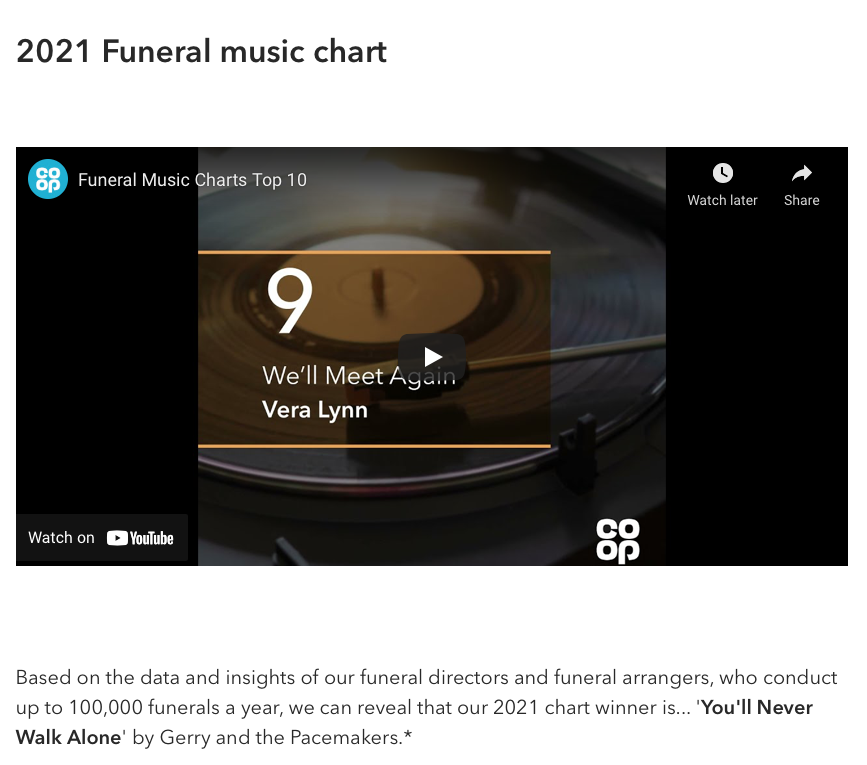Every autumn, the Co-Op publishes its annual Funeral Music Chart which for some time now has been completely secular. In 2019 – for the first time ever – there were no hymns in the Top Ten, so the sub-editors had a field day.
‘The Lord’s My Shepherd and Abide with Me… have been elbowed aside as Sheeran and Westlife are catapulted into the top,’ chuckled The Guardian: ‘No hymns, now the end is near and we face the final curtain’, sniggered The Daily Telegraph.
This year it’s an oldie but goodie in the number one spot; ‘You’ll Never Walk Alone’, by Gerry and The Pacemakers, its position a poignant reflection of the way in which we couldn’t come together during the first twelve months of the pandemic.
It hardly needs repeating, but Britain is now a largely secular nation. Most of us are not religious, and both church attendance and religious funerals have been declining for decades. According to The Church Times, there was a 29% fall in clergy-led funerals between 2008 and 2018, and in 2019, there were 14,000 fewer funerals than the previous year. As a humanist, you might expect me to be delighted, but I am not.
Christianity has been a part of the culture of these islands for more than a thousand years, and while it no longer dominates our outlook, it is still a part of our shared inheritance. Only a few years ago, in a public conversation with the former Archbishop of Canterbury Rowan Williams, the world’s most celebrated critic of religion Richard Dawkins described himself as ‘a cultural Anglican’ and admitted he sings hymns in the shower. I’ve never caught myself doing that, but I know where he’s coming from.
Some years ago, I conducted the funeral of a man who was not merely an atheist, but a communist atheist. In his will, he had asked for a humanist funeral, but he also wanted a hymn, ‘For Those in Peril on The Sea’. During the Second World War he had served on the Arctic Convoys, which at the time were described by Winston Churchill as ‘the worst journey in the world’ and dubbed ‘suicide missions’ by the seamen who undertook them. I agreed to his request, knowing as I did so that I was breaking the rules of the organisation of which I was then a member that there should be ‘no hymns or prayers’ in our ceremonies.
That always struck me as odd. Humanist funerals are secular, but humanists in England or Wales have always allowed religious content if it reflected the life of the deceased, which is why – if dad was in the Boys Brigade, mum was in the Women’s Institute, or your brother was an England rugby supporter – the congregation might have sung, ‘Will Your Anchor Hold’, ‘Jerusalem’ or ‘Swing Low Sweet Chariot’ in their memory.
Why is Scotland so different? Richard Holloway, the former Bishop of Edinburgh, answered that question for me a couple of years ago when he launched his book, ‘A Little History of Religion’. He said that new beliefs always oppose those that dominate their time and place, which is why England’s more tolerant humanism reflects Anglicanism’s mild-mannered ‘broad church’, while Scotland’s rather spikier version mirrors the righteous authoritarianism of Calvinism. As in so many things, I think the good Bishop was right.
I can understand why humanists once felt hymns or prayers weren’t appropriate. The first humanist funerals were held for people who couldn’t have, or didn’t want a Christian burial because of their beliefs, so a friend or comrade would deliver a eulogy when they were laid to rest. But times have changed: the clergy have long since come to terms with secular music in their ceremonies, and one of the reasons I’m a celebrant with the humanist and spiritual organisation Celebrate People is that we take a similarly inclusive approach.
People love humanist funerals for their compassion, their honesty and their humour: they choose them for what they include, not what they exclude. So, by all means have ‘One Day at a Time’ if your granny loved Lena Martell, or ‘The Old Rugged Cross’ if it was the only tune your granddad knew: I, and my colleagues will be delighted to hear it. Let the people sing!

0 Comments Leave a comment